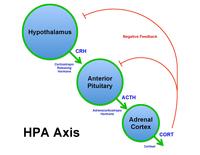
Photo from wikipedia
Chronic stress results in neurochemical, physiological, immune, molecular, cellular, and structural changes in the brain and often dampens the cognition. The hippocampus has been one major focus in studying the… Click to show full abstract
Chronic stress results in neurochemical, physiological, immune, molecular, cellular, and structural changes in the brain and often dampens the cognition. The hippocampus has been one major focus in studying the stress responsivity and neural mechanisms underlying depression. Both acute and chronic stress stimuli lead to dynamic changes in excitatory transmission in the hippocampus. The present study examined the potential effects of spontaneous recovery after chronic stress on spatial memory function and glutamatergic transmission in the hippocampus. The results showed that chronic unpredicted mild stress transiently increased AMPA receptor GluA2/3 subunit expression, together with elevated PICK-1 protein expression. Spontaneous recovery restored the behavioral deficits in Barnes maze test, as well as the glutamate receptor expression changes. In conclusion, spontaneous recovery acts as an important mechanism in system homeostasis.
Journal Title: Neural Plasticity
Year Published: 2018
Link to full text (if available)
Share on Social Media: Sign Up to like & get
recommendations!